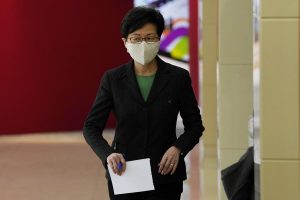Hong Kong leader Carrie Lam said Friday that whoever wins the U.S. presidential election should end the United States’ interference in the internal affairs of her city and China overall.
She accused the Trump administration of repeatedly interfering over the past year, citing U.S. sanctions on officials including herself and the suspension of special trading conditions previously granted to Hong Kong.
“That is totally unreasonable,” she said at a news conference wrapping up a four-day visit to Beijing. “I hope that they will come back to normalcy and accept that the relationship has to be built on mutual respect and cooperation.”
The United States took issue earlier this year with China’s enactment of a national security law for Hong Kong, which was designed in part to snuff out pro-democracy protests that rocked the city for months last year.
The Trump administration backed democracy activists who said that the law ended the “one country, two systems” framework under which Hong Kong is part of China but given a high degree of autonomy over local affairs.
Lam said the national security law has been an effective deterrent after pitched battles between demonstrators and police during protests last year. Some more radical protesters attacked businesses seen as pro-Beijing and set fires in the streets. They said the escalating tactics were necessary to get the attention of a government that was ignoring their demands.
“Hong Kong has recovered its stability and has not seen any large-scale violent incidents,” Lam said. “With this stable environment we can focus on economic development and improving people’s lives.”
Earlier Friday, Lam met with a top Chinese Communist Party official who endorsed her rule, saying her government had restored order and revived the economy.
Vice Premier Han Zheng, one of seven members of the party’s top leadership body, praised her administration for implementing the national security law and protecting Hong Kong’s stability, and for its handling of the COVID-19 pandemic, easing the economic burden on the population.
Under Lam, the government has “overcome all kinds of difficulties and dealt with the challenges,” he said.
It was a far cry from a year ago, when parts of the city were awash in tear gas and Lam’s leadership and ability to return peace to her city seemed to be in question.
China responded by enacting the national security law, which curtailed protests that were already dwindling because of coronavirus restrictions on public gatherings.
Lam was accompanied on her visit by several top city officials, which she said demonstrates the breadth of Hong Kong’s integration into China’s national development. Her visit to Beijing has been pitched as an attempt to “to get more support for Hong Kong, in various aspects of our economy,” as Lam told reporters Friday. She added that the trip was designed to discuss “a series of measures that I would love to have more Central Government’s support,” but declined to give details on what those measures were or the outcome of the talks.
In a previous meeting, she praised China’s minister of commerce for offering support at a time when “many Hong Kong enterprises engaging in external trade are under pressure due to the unilateral measures of the United States and the epidemic.” Lam said she hopes that Hong Kong can contribute to and benefit from China’s efforts to boost domestic consumption and advance science and technology innovation.
She was heading from Beijing to Guangdong, the southern province that borders Hong Kong, for economic talks on the Greater Bay Area, a region that also includes nearby Macao. Her final stop will be Shenzhen, the mainland city closest to Hong Kong, which has become a booming business hub.
By Ken Moritsugu for the Associated Press in Beijing, China with additional reporting by The Diplomat.
































